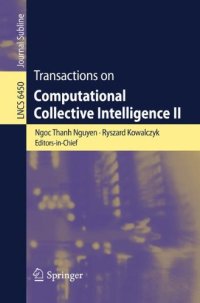
Ebook: Transactions on Computational Collective Intelligence II
- Tags: Artificial Intelligence (incl. Robotics), Computer Communication Networks, Information Systems Applications (incl.Internet), Software Engineering, Information Storage and Retrieval, Computation by Abstract Devices
- Series: Lecture Notes in Computer Science 6450 : Transactions on Computational Collective Intelligence
- Year: 2010
- Publisher: Springer-Verlag Berlin Heidelberg
- City: Berlin ; Heidelberg
- Edition: 1
- Language: English
- pdf
Welcome to the second volume of Transactions on Computational Collective Intel- gence (TCCI), a new journal devoted to research in computer-based methods of c- putational collective intelligence (CCI) and their applications in a wide range of fields such as the Semantic Web, social networks and multi-agent systems. TCCI strives to cover new methodological, theoretical and practical aspects of CCI understood as the form of intelligence that emerges from the collaboration and competition of many individuals (artificial and/or natural). The application of multiple computational int- ligence technologies such as fuzzy systems, evolutionary computation, neural s- tems, consensus theory, etc. , aims to support human and other collective intelligence and to create new forms of CCI in natural and/or artificial systems. TCCI is a double-blind refereed and authoritative reference dealing with the wo- ing potential of CCI methodologies and applications, as well as emerging issues of interest to academics and practitioners. This second issue contains a collection of 10 articles selected from high-quality submissions addressing advances in the foun- tions and applications of computational collective intelligence. In “Integration P- posal for Description Logic and Attributive Logic – Towards Semantic Web Rules” G. Nalepa and W. Furmanska propose a transition from attributive logic to description logic in order to improve the design of Semantic Web rules. K. Thorisson et al.
These Transactions publish research in computer-based methods of computational collective intelligence (CCI) and their applications in a wide range of fields such as the Semantic Web, social networks and multi-agent systems. TCCI strives to cover new methodological, theoretical and practical aspects of CCI understood as the form of intelligence that emerges from the collaboration and competition of many individuals (artificial and/or natural). The application of multiple computational intelligence technologies such as fuzzy systems, evolutionary computation, neural systems, consensus theory, etc., aims to support human and other collective intelligence and to create new forms of CCI in natural and/or artificial systems. This second TCCI issue contains a collection of 10 articles selected from high-quality submissions addressing advances in the foundations and applications of computational collective intelligence